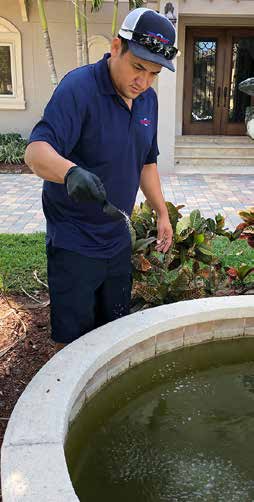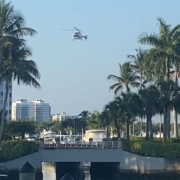Mosquitos – Where Are They Coming From?

Patrick Linn, MS, MSHAPI
Executive Director, Collier Mosquito Control District
You’ve retrieved the morning paper and just settled down to check the headlines…but wait – your ankles are itching with newly acquired mosquito bites! You and your friends are enjoying a relaxing Naples sunset when a distinct, high-pitched buzzing prompts frantic swatting and a rapid retreat to the indoors.
Where are these annoying mosquitoes coming from? It’s wintertime, it hasn’t rained in days, and you don’t see any standing water. The answer to the question may require the expertise of a Collier Mosquito Control District field technician because not all mosquito sources are as obvious as an open 5 gallon bucket of standing water.
The District’s highly trained field technicians can help find the source of these blood suckers with a complimentary inspection. Our technicians are trained to find the obscure spots on your property (or in nearby areas) where mosquitoes can be breeding or are hunkered down during the day.
While it is true that mosquitoes require standing water to breed and lay eggs, the standing water may be harder to find in the dryer winter months. In Southwest Florida’s subtropical environment, both water and
warm (enough) temperatures remain abundant in the winter months. Given these conditions, eggs will mature into flying, biting adults in as few as 7 days. If a breeding site is found during inspection, the
District’s technicians can suggest solutions and likely apply a one-time treatment of larval control material. By identifying the source and preventing the larvae from emerging, adult mosquito populations can be reduced greatly.
 One of the most effective means of larval control in “undrainable” water is the application of Bti (Bacillus thuringiensis subspecies israelensis). Bti is a biological bacterium found in soils, and its toxins only affect the larvae of mosquitoes, black flies, and fungus gnats. These toxins do not affect other types of insects such as honeybees or dragonflies. It poses no toxicity to people and is approved for use in organic farming operations. Not only does the District use this product extensively, it can also be purchased in gardening and home improvement stores.
One of the most effective means of larval control in “undrainable” water is the application of Bti (Bacillus thuringiensis subspecies israelensis). Bti is a biological bacterium found in soils, and its toxins only affect the larvae of mosquitoes, black flies, and fungus gnats. These toxins do not affect other types of insects such as honeybees or dragonflies. It poses no toxicity to people and is approved for use in organic farming operations. Not only does the District use this product extensively, it can also be purchased in gardening and home improvement stores.
The District’s field technicians will also perform a careful inspection to determine where adult mosquitoes may be hiding during daylight hours. One of the most unassuming spots they’re found is under shrubs and in piles of horticultural debris. That’s why a well-groomed property is not inviting for mosquitoes.
More than 50 species of mosquitoes are found in our area, and some species have a considerable flight range so the source may lie well beyond the limits of your little slice of paradise. In that case, knowledge is power, and we’ll provide you with all you need to protect yourself and loved ones from these pests.

To request a field technician inspection for your home or business, please use the form on the District’s website: cmd.org/request-field-technician or call us: 239-436-1000.
Want to learn more about the District’s operations and integrated mosquito management program? We offer public tours of our facilities for groups, and our Outreach team conducts presentations for HOA meetings, civic organizations, and other interested groups. Please call our office for more information. Visit the District’s website at cmcd.org




Leave a Reply
Want to join the discussion?Feel free to contribute!